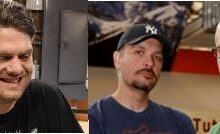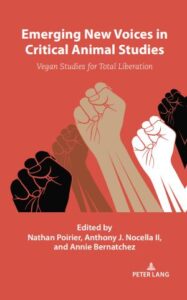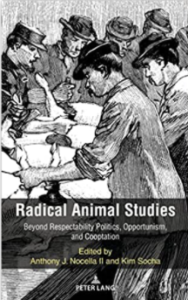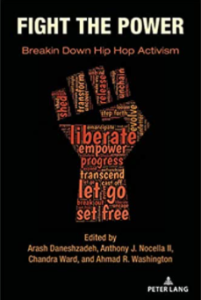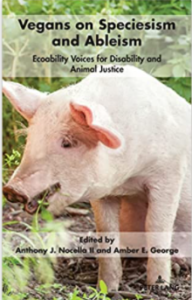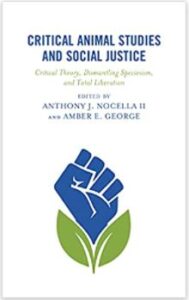Scholar-Activist Spotlight with Aliya Weise – September 2019

Annie Bernatchez – How did you become a CAS scholar-activist? What is motivating you to stay committed to this social justice issue?
Aliya Weise – I cannot easily summarize the myriad events have that led to my interest in CAS, neither could I identify a singular turn or tipping point at which time my academic and activist interests found some resonance with CAS. I suppose what could give is an account of the first stirrings of comradery and inspiration upon encountering like-minded work. It was one of those moments I suspect many voracious readers experiences where one feels as if another has taken their amorphous and incoherent wonderings and organized them upon the page with far greater eloquence and accuracy. Regarding CAS, this occurred for me as I read Carol J. Adams Sexual Politics of Meat.
I cannot recall exactly how this book came into my life for it was some time ago. I know I had only recently returned home, passed my GED, and begun attending courses at my area community college. (I had left home and high school with the naïve belief I might single-handedly find a better way to live in the world than those I so ignorantly held in contempt for having destroyed habitat and lives.) While during my youth I had been a bit secretive and coy about my intellectual appetite, my time at Green River College in Auburn, Washington had begun to bring my predilection for intellectual pursuits out of the closet.
I recall that I was fortunate enough to stumble across a course that was team taught by two of the most amazing educators I have ever had the privilege of knowing—Sandra Johanson and Marcie Sims. The course explored intersections of literature and philosophy with at least some units attentive to Feminism. I know it was sometime during that term and those units that I came across Adam’s Sexual Politics of Meat and so much of what she wrote just clicked for me. I am sure if someone was unfortunate to see me reading the book at that time they would have seen me constantly nodding in silent agreement punctuated occasionally with verbal utterances like, “Exactly!” and “Yes, that’s what I have been saying!” Of course, Adam’s insights were more revelation than confirmation but I’m sure you get the picture. In any event, ever since that course in 1997, I have been pursuing this work after some fashion or another.
However, I would be grossly misrepresenting my history if I claimed an uninterrupted or sustained effort towards the goals of CAS specifically or the improvement of animal lives more generally. What has felt at times like innumerable “life events” have cropped up, and thus my scholar-activist work has been intermittent by even the most generous of standards. Between protests at Covance or a dissertation on CAS and literature were long stretches of working at jobs completely unrelated to these matters to support myself, my son, and my family. In retrospect, I think these delays in my academic and activist ambitions have helped instill in me experientially the incredible value of patience, of persistence, and of compassion for the precarity of lives—be they categorized as human, animal, or the myriad other labels we so blithely apply.
Thus, while I cannot identify why I find a kinship with the kind of emancipatory scholarship CAS pursues, I can affirm that it is the ongoing and complex contingencies of so many lives—of others and of my own, of nonhuman and of human—is what keeps me “committed” to what I would characterize as my life’s work. To me, that work is simply doing what little I to bring compassion, hospitality, and justice to an ever increasing and more foundational role in our world. If not me, then who? If not now, then when?
AB – You recently graduated from The George Washington University, tell us about your Ph.D. thesis.
AW – I began this project in 2006 but took a ten-year hiatus to raise my son. At that time, I was struggling to articulate what I saw as the deep, structural implications of what was then a very nascent field. At that time and until my return to academia in 2015, I felt that much of the work I encountered in CAS overlook some significant insights from the study of literature; similarly, we are only just beginning to acknowledge the full implications of the way in which Literary Studies has taken for granted the expendability and fungibility of the animal. My inspiration was thus to offer a small contribution to correct these oversights.
I wanted to bring CAS and Literature Studies into conversation because I believe each has much to learn from the other. The title of my thesis was Humanimalities: Sacrifice and Subjectivation in Literature of the “the Animal Turn” and it was my hope that even in the title one might sense how I felt that the so called “animal question” did not only radically impact literature studies topically but also structurally. The dissertation argued for a greater recognition of the impact “the animal turn” has had on literary studies by analyzing a group of influential North American writers who were critically engaged with fascist formulations of bodily expendability and the entanglement of violence that crosses species boundaries. I took a sustained look at narrative accounts where human genocide and nonhuman animal slaughter offered key sites for consideration of the intersectionality of oppression. It was my contention that such narratives offered readers the opportunity to explore the possibility of homology while acknowledging the limits of any analogy. Which is to say that modes, methods, and structures of deployment might be similar, but we are wise to be extremely cautious of equating the experiences of those exterminated.
Literature I defined as being of “the animal turn” explores the entanglements of subjectivation across humanist and speciesist divides, divisions that determine in advance who or what might be killed or let die with impunity. While evidently emphatic about the different experiences of oppression, the narratives I considered nonetheless identified and critiqued this speciesist discourse specifically but in a way that resulted in an unresolved and unresolvable tension—a tension that acknowledges a shared complicity in physical and discursive violence yet strives to call for a new response to the “question of the animal” that might at least ameliorate the suffering, pain, and death experienced by so many. This new response, I argued, requires a merger of the humanities and sciences: what I called Humanimalities.
My hope was to draw out our implicit and explicit critiques of the sacrificial structure of the Western subject—indeed, of narrative itself. As if traveling along a Möbius loop, I wanted to affirm a CAS standpoint for critical readings of literature and simultaneously to highlight literature’s critical engagement with matters at the core of CAS. Thereby, I might not just demonstrate the validity and even necessity of CAS as a framework for literature studies and thereby explore the complicated navigations of selected narratives as they attempted to resist calculations of expendability; I might also, my hope was, demonstrate how authors and other scholars within literature studies provide important complications of the utopian vision at the core of CAS that we call “total liberation.” Each narrative I considered earnestly struggled with a utopian impulse, some facet of the total liberation for which CAS call, yet was consistently forced to face the obstacles to coalition building, the different experiences of oppression, and even an acknowledgement of their own narrative’s complicity in the sacrificial structure that supports and sustains the worst of all violence: genocide.
My dissertation attempted to consider why and how we might bring CAS and Literary Studies into dialogue at a much deeper level than had hitherto been done and how doing was to their mutual benefit. In its most concise formulation, I sought to consider how a CAS rejection of the expendability of the animal might ask of us as readers and writers to reconsider not simply the trope of the animal as a symbol or metaphor but also to reconsider the very logic of sacrifice itself, a logic which I argued undergirds much in the narrative form itself. Simultaneously, I contended that the study of literature has much to offer CAS in general but in two ways most urgently. First, literature studies have much to offer regarding the way in which animal agency (resistance) is so often depicted (and therefore conceptually reified) in advance to be entirely absent, severely lacking, or somehow insufficient and thereby necessitates our (human) intervention. Second, literature studies trouble the utopian vision of total liberation in important and I contend productive ways.
I do not feel that I achieved these goals as rigorously as I could have, or at least as vigorously as I would have liked. Despite the simply wonderful and engaging support of my committee members—Robert McRuer, David Mictchell, and Anthony J. Nocella II—family obligations and financial limitations demanded that I conclude my dissertation and doctoral studies as promptly as possible. I received some outstanding feedback at my defense and have since furthered my research with additional resources I would like to bring to bear on this topic and thus I look at my dissertation as the draft of a more robust book-length project that increases its scope beyond some of the disciplinary boundaries necessitated by institutional structures.
I just really wanted to justify CAS as a valid and necessary reading lens for literature and to propose literature’s value for CAS scholarship. Retaining some of my youthful naïveté, I wanted to make the world a better place by suggesting we read more closely, listen more carefully, and in doing so perhaps see in the Other—human or non-human—a life worth letting live.
AB – What is the most interesting thing you learned from your research and how does it connect and contribute to CAS theory-to-practice?
AW – It is difficult to limit my selection of the most interesting thing learned from my research to one singular item, to reduce such a messy multiplicity to a neatly categorized singularity. Nevertheless, I think the most interesting contribution my research makes for CAS theory-to-practice is likely to be the most rejected out of hand: the troubling, problematizing, or complicating of the CAS goal of total liberation. Going far too quickly, I contend that by bringing literary studies into conversation with CAS the most interesting contribution made in my project is the identification of the dangers in the utopianism in CAS’s call for “total liberation.” This is a utopianism that has a kinship with other chimeras, other messianisms, and other teleologies and they have always carried alongside them, within them, and behind them the eschatological, the apocalyptic, and the violence of homogeneity in general. However, such dangers do not provide justification for the wholesale rejection of CAS’s total liberation specifically or of CAS principles more generally. It is instead to insist upon extreme caution and care, to proceed accompanied by the known dangers. This is a delicate and nuanced argument and one which requires greater explication than I can provide in this space. I would just insist that implications are legion and offer as one very brief example that one might simply consider the common phrase and associated philosophy of “giving voice to the voiceless” as it is deployed in Animal Activism while rightly critiqued by Disability Studies, Critical Race Studies, and other scholar-activist areas of study.
AB – You are also a long-time English, Language Literature and Creative Writing instructor, how do you integrate CAS principles in your everyday pedagogy? What are the most common reactions and comments you meet from young students?
AW – This is a very difficult question. My commitment to education, literature, language, and creative writing are so entangled with the foundational principles of CAS that to say the latter inform the former is (for me) a statement whose denial would be self-contradictory in a kind of Leibnizian sense. I am sure this is because of my alignment with Critical Pedagogies like Pedagogy of the Oppressed and Teaching to Transgress. Perhaps, it would be most helpful to consider in turn each of the ten core principles of CAS and how I see them forming or comingling with my pedagogical practices:
Interdisciplinary and Collaborative. CAS calls for interdisciplinarity and I approach education and writing as essentially, necessarily interdisciplinary as such. The practice of careful reading and thoughtful writing inherently offers a hospitable space for perspectives typically ignored.
Subjective Theory. Successful education and effective writing are always about uncovering the hidden, about making apparent what was intentionally or accidentally obscured. This is the case in my classrooms to such an extent that my own practices, reading frames, and writing methods are themselves opened to examination, critique, and even rejection.
Theory to Practice. I advocate to my students that they always consider how they might use or deploy or enact that which we learn in class. Young students find it very helpful and refreshing to link the work done in the classroom to their daily lives and are frequently grateful for such an approach.
Holistic and Transformative Education. I would wager that advancing a holistic understanding of oppression would be the principle most CAS scholar-activists fear would be controversial or problematic for K-12 educational institutions. However, I have found quite the opposite to be the case, particularly of my secondary school students. So long as an educator is clear not to impose their conclusions, positions, or politics (which would be in total opposition to CAS principles, would it not?), so long as the educator does not equate oppressions or the experience of oppressions, so long as one does not erase or elide the significance and material conditions of difference, so long as these are done students are incredibly eager to identify structural similarities in oppression of other humans, animals, and the planet. The educator need only support students in their own inherent ability for deep inquiry and they themselves frequently begin to identify the homology of oppressions—the commonalities of oppressive structures. Students, young and old, are eager to engage with such entanglements, such interlocking of systems of domination.
Anarchism. This is where I find some need for improvement in the CAS principles, specifically regarding education. The language of “rejection” that CAS makes use of can be a significant deterrent to students and has indeed been troublesome for me at times. In some ways, this might risk rejecting students’ opinions, conclusions, backgrounds, etc. and that is obviously something we never wish to do, least of all because it violates this very CAS principal by imposing a hierarchy. Dismantling hierarchical structures in favor of the democratized, however, is not a particularly difficult idea or approach for students to adopt as they are eager to have their voices heard and accounted for in their education.
Solidarity, Alliances, and Intersectional. Keeping in mind the aforementioned concerns around the language of “rejection,” favoring alliances and solidarity in to oppose oppression and hierarchy is easily and frequently explored in literature and writing classroom environments. Be it by open debate, seminars, or the workshoping of student writing, I strive to facilitate a consideration of how texts are always engaged with complex issues on multiple fronts, asserting liberation here but overlooking or relying upon oppression over there. Students experience the significance and value of alliances as well as the difficulty of their shifting, and at times conflicting, constituent interests.
Total Liberation. As noted in my earlier answers, the idea of “total liberation” is complicated and unstable, but it is also necessary. I feel that many students could easily support such a position theoretically but can also feel overwhelmed by the implications. My role as an educator is not to dictate but to accompany, and therefore I hope to aid students in their own pursuit and practice of justice, freedom, and liberation. This may not be to the same extent or in the same way as their peer or instructor. Instead, I hope to support them as they find the fullest expression for which they are presently ready.
Deconstructs Binaries. I would humbly suggest that this principle is in fact redundant of earlier ones. However, I suppose my pedagogical framework best exemplifies this principle in my encouragement of students to write their own stories before someone else writes it for them. And, in turn that they read carefully the stories of others so as to not presume in advance their struggles, victories, and experiences.
Supports All Tactics for Social Changes. Students with whom I work consider both typical and radical forms of political strategies quite frequently when they encounter fiction, poetry, and nonfiction. Many students with whom I work rigorously examine, critique, and engage with strategies deployed by social justice movements of the past and present. Not just as an educator but as a scholar, writer, and activist I encourage any student to consider the impact of their choices—the impact upon their own lives, upon the lives of others, and upon society more generally. I find it is a good practice personally and pedagogically to consider how one might feel about such strategies if they were used by those who might be ideologically opposite one’s own position. If you find them objectionable, it is worth seriously reconsidering.
Promote Critical Dialogue. Educating our young people, giving them the power to read critically and articulate their positions effectively is essential to creating constructive and critical dialogue on issues relevant to CAS. The literature, poetry, and nonfiction writing with which we engage and which we produce is always engaged with the world around them, seeking to change that world in some manner, and struggling to illicit or call forth a future more in alignment with their core principles.
AB – Are you working on anything now and what are your future plans?
AW – I am working on a book of poetry that meditates upon and troubles the normative concept of the “male” in the plant, animal, and human worlds. I am revising my dissertation to create a book-length contribution to CAS and literary studies. And, I would like to forge a home for CAS in a literature department at a major university.



